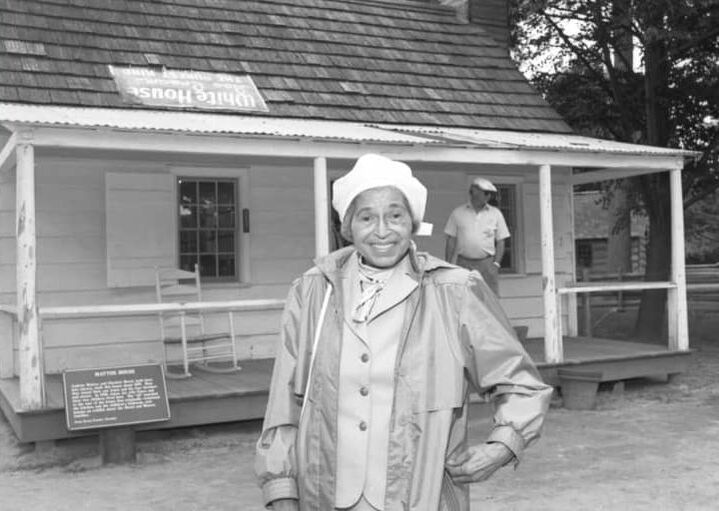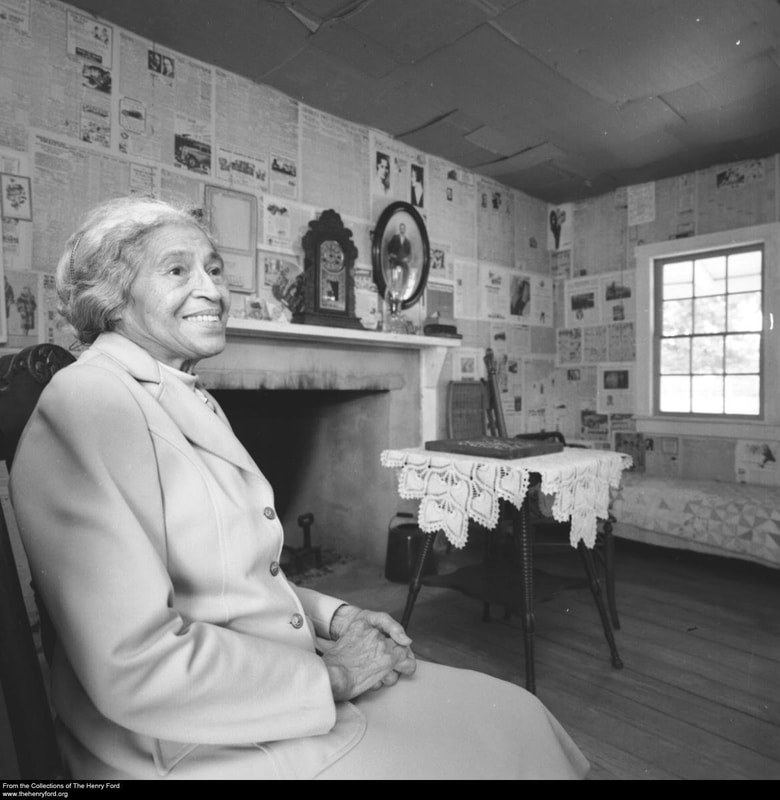|
As I write this I am sitting in front of what is known as the "Rosa Parks Bus." It is the bus that the famous incident involving Mrs. Parks refusing to give up her seat took place. In my research on the American Woman Parks' name has come up several times. Let me back up. This week Logan and his buddy Derek are participating in Day Camp at the Henry Ford. The Henry Ford is like Disney World for history nerds and is a must see. The Henry Ford is made up of multiple institutions the main two being the Museum of American Innovation and Greenfield Village. When Henry Ford created them his goal was to tell history from the perspective of the average American. History is about presidents and important figures, but it's also about the innovations that impact our every day lives. Both the Village and Museum are dedicated to celebrating those innovations and honoring our nation's history. So, back to the bus. In just the few minutes it's taken to type this, almost 50 people have climbed on and off the bus. A docent inside tells the story of that December day in Alabama and points out the seat that Parks refused to give up. The children inside excitedly vie to sit in the exact spot then skip off happy that they've experienced a part of history. There's even a Scandinavian tour group with professional film equipment filming about it. I have no idea what they are saying but it’s interesting to watch them explore the history of our country. In my research about American women, I've come across Rosa Parks several times. Each time I've read that she is brave because she sat. When I read this it's felt like something has been missing. There were several people before Parks who were arrested for refusing to give up their seats which made me wonder what was different about their story. They sat. Why don't their names go down in history? Oddly enough the answer came when I was reading the book The Power of Habit: Why We Do What We Do in Life and Business. In the chapter referring to habits of societies, Duhigg explains that Parks was a unique individual because of her character and her community involvement. "Parks' many friendships and affiliations cut across the city's racial and economic lines. She was the secretary of the local NAACP chapter, attended the Methodist church, and helped oversee a youth organization at the Lutheran church near her home. She spent some weekends volunteering at a shelter, others with a botanical club, and on Wednesday nights often joined a group of women who knit blankets for a local hospital. She volunteered dressmaking services to poor families and provided last-minute gown alterations for wealthy white debutantes." He goes on to connect the facts and mentions that the previous riders who refused to move were arrested, but nothing came of it because they were unknowns, yet when Rosa Parks was arrested it caused a ripple through the community. She had invested her time in the community and that community came to her support. But all that community doesn’t explain my discomfort with celebrating Rosa Parks for "sitting." Duhigg, after detailing Parks' community involvement, explained that the former leader of the Montgomery NAACP and a white lawyer named Clifford Durr bailed her out of jail. Community leaders had been looking for a case to challenge bus segregation and with Parks' sterling reputation they believed they had found a worthy cause to take to the courts. Parks' husband was initially opposed to the idea because he knew the danger she was putting herself in. Her husband's warning, "The white folks will kill you, Rosa," was not an empty worry. Threats of violence and death were common for those who dared to alter the status quo, but despite the possible danger, Parks allowed her case to be the rally point for the protests and the boycott. Both she and her husband lost their jobs and received multiple death threats. Yet, she didn't give in and she allowed her case to move through the courts. Eventually, they moved to Detroit hoping to start over after losing so much. There! There it is! Now, I am beginning to understand what was so remarkable about her. She shouldn't be remembered as a woman who sat. She should be remembered for 1.) Her kindness and community involvement. 2.) Refusing to move despite knowing the possibility of arrest or physical violence. (I was told by the docent that the bus drivers often carried clubs or guns to enforce the rules.) 3.) Standing and allowing her arrest to be used in the court case that changed a city and became a major event in the Civil Rights Movement despite the costs. Too often we relegate people's stories to a paragraph and forget that their lives are as complicated and as deep as our own. Rosa Parks' story is one of compassion, community, and courage. She didn't receive the notoriety she has today until much later in her life. In our culture of instant gratification, it is important to share that standing up for something and being remembered rarely happens for those who don't have a depth of character. We need to remember that standing for what you believe in is not easy and will likely not lead to fame and success, but doing something because you believe it is the right thing to do may just change the world. Rosa Parks visited the Greenfield Village in 1992. These photos are of her at the Mattox House.
0 Comments
Leave a Reply. |
"A jack of all trades is a master of none, but oftentimes better than a master of one." Archives
May 2020
Categories
All
|
AdventuresGet in Touch |



 RSS Feed
RSS Feed